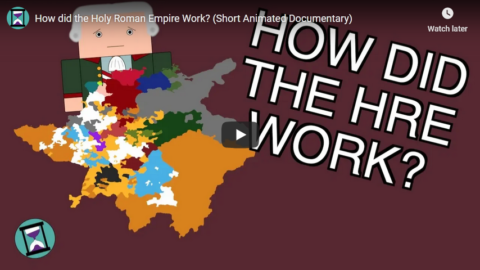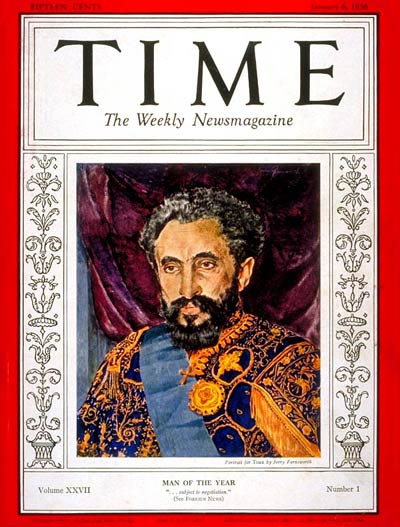While he was in the Tower, Henry III wrote a letter to the nation saying that he was a Good Thing. This so confused the Londoners that they armed themselves with staves, jerkins, etc., and massacred the Jews in the City. Later, when he was in the Pope’s Bosom, Henry further confused the People by presenting all the Bonifaces of the Church to Italians. And the whole reign was rapidly becoming less and less memorable when one of the Barons called Simon de Montfort saved the situation by announcing that he had a memorable Idea.
Simon de Montfort’s Good Idea
Simon de Montfort’s Idea was to make the Parliament more Representative by inviting one or two vergers, or vergesses, to come from every parish, thus causing the only Good Parliament in History. Simon de Montfort, though only a Frenchman, was thus a Good Thing, and is very notable as being the only good Baron in history. The other Barons were, of course, all wicked Barons. They had, however, many important duties under the Banorial system. These were:
- To be armed to the teeth.
- To extract from the Villein(*) Saccage and Soccage, tollage and tallage, pillage and ullage, and, in extreme cases, all other banorial amenities such as umbrage and porrage. (These may be collectively defined as the banorial rites of carnage and wreckage).
- To hasten the King’s death, deposition, insanity, etc., and make quite sure that there were always at least three false claimants to the throne.
- To resent the Attitude of the Church. (The Barons were secretly jealous of the Church, which they accused of encroaching on their rites — see p. 30, Age of Piety.)
- To keep up the Middle Ages.
(*) Villein: medieval term for agricultural labourer, usually suffering from scurvy, Black Death, etc.
W.C. Sellar & R.J. Yeatman, 1066 And All That, 1930.
June 3, 2021
QotD: Simon de Montfort
February 8, 2021
How did the Holy Roman Empire Work?
History Matters
Published 25 Aug 2019Twitter: https://twitter.com/Tenminhistory
Patreon: https://www.patreon.com/user?u=4973164
Merch: teespring.com/stores/history-matters-…Special Thanks to the following Patrons for their support on Patreon:
Kevin Sanders
Chris Fatta
Daniel Lambert
Richard Wolfe
Joshua
Tom Loghrin
Warren Rudkin
Andrew Niedbala
Mitchell Wildoer
Blaine Tillack
Bernardo Santos
Matthew
John Garcia
Richard Hartzell
Will Davis-Coleman
Danny Anstess
Henry Rabung
August Block
Perry Gagne
Shaun Pullin
Joooooshhhhh
Vesko Dinev
PaulToon
Kelly Moneymaker
FuzzytheFair
Armani_Banani
Jeffrey Schneider
Byzans_Scotorius
Seth Reeves
Haydn Noble
Josh Cornelius
Gideon Rashkes
Spencer Smith
Cornel Borină
Roberto
Andrew Keeling
Richard Manklow
Chance Cansler
João Santos
Gabriel Lunde
Pierre Le Mouel
anonHow did the Holy Roman Empire work? It was an antiquated mess but it did have a system of government that did work. Sort of. If everyone felt like it.
Sources:
Prussia’s Relations with the Holy Roman Empire, 1740-1786 by Peter H. Wilson.
Benjamin Franklin, Student of the Holy Roman Empire: His Summer Journey to Germany in 1766 and His Interest in the Empire’s Federal Constitution by Jürgen Overhoff.
The Constitution of the Holy Roman Empire after 1648: Samuel Pufendorf’s Assessment in His Monzambano by Peter Schröder.
Bolstering the Prestige of the Habsburgs: The End of the Holy Roman Empire in 1806 by Peter H. Wilson.
July 9, 2020
May 9, 2020
History Summarized: The Meiji Restoration
Overly Sarcastic Productions
Published 8 May 2020Japan may well have the record for World’s Speediest Industrialization, but how did they accomplish so much so fast without falling victim to Europe’s favorite 19th century pastime of “Colonization”? And how did Japan build up a Pan-Asian empire so darn quickly? All that and more in this deep-dive into the Meiji Restoration!
SOURCES & Further Reading:
Modern Japan: A Very Short Introduction by Goto-Jones.
The Japanese Empire: Grand Strategy from the Meiji Restoration to the Pacific War by Paine.
Bushido: The Soul of Japan by Nitobe.THAT WACKY POLITICAL CARTOON: “Japan Makes Her Debut Under Columbia’s Auspicies” https://tile.loc.gov/storage-services…
This video was edited by Sophia Ricciardi AKA “Indigo”. https://www.sophiakricci.com/
Our content is intended for teenage audiences and up.
PATREON: https://www.Patreon.com/OSP
DISCORD: https://discord.gg/h3AqJPe
MERCH LINKS: https://www.redbubble.com/people/OSPY…
OUR WEBSITE: https://www.OverlySarcasticProductions.com
Find us on Twitter https://www.Twitter.com/OSPYouTube
Find us on Reddit https://www.Reddit.com/r/OSP/
April 29, 2020
Feudalism: A Brief Explanation
Thersites the Historian
Published 26 Oct 2017In this video, I try to bring order to the chaos that is feudalism and render it comprehensible.
November 9, 2019
Ten Minute English and British History #11 – King John and the Magna Carta
History Matters
Published 1 Jan 2018Twitter: https://twitter.com/Tenminhistory
Patreon: https://www.patreon.com/user?u=4973164This episode covers the reign of King John and the problems he had securing the Angevin inheritance and the subsequent issues his barons posed. These problems culminated in the signing of the Magna Carta in 1215 which severely limited the strength of John and his son, Henry III, whose reign was overshadowed by the document.
Ten Minute English and British History is a series of short, ten minute animated narrative documentaries that are designed as revision refreshers or simple introductions to a topic. Please note that these are not meant to be comprehensive and there’s a lot of stuff I couldn’t fit into the episodes that I would have liked to. Thank you for watching, though, it’s always appreciated.
March 18, 2019
QotD: The eternal bad bet that was feudalism
From time immemorial, the reigning myth of rule has been that the rulers provide a quid pro quo: in exchange for the people’s submission and payment of tribute, the rulers protect the people from the enemies who lurk “out there.” The promise was often unfulfilled, however. The lord of the manor might well flee into his castle, leaving the peasants outside the walls to suffer whatever outrages an invader chose to wreak on them. Or the lord might haul them off to a distant war in which they had no real interest, merely to satisfy the lord’s feudal obligation to the baron or duke just above him in the feudal pecking order.
Most important, however, is the sheer fact that the ordinary people’s most dangerous enemy, the one by far the most likely to plunder and abuse them, was their own impudent lord, the selfsame “nobleman” who forbade them to leave their place of birth or to engage in a variety of tasks and pleasures they might prefer — that is, the man who held and exploited them in a condition of serfdom.
Robert Higgs, “I Reject the Right of the Government to Choose My Friends and Enemies for Me”, The Beacon, 2017-04-03.
January 28, 2019
QotD: Inequality in academia
We’ve heard a lot about the problem of inequality in America over recent years. But most of that talk has ignored one of the very worst pockets of inequality in American society. I speak, of course, of the American university system and its treatment of adjunct professors and graduate students.
Academics seem to think that the business world is a feudal environment characterized by huge status differentials and abusive treatment of underlings. They think that because, to be honest, that’s a pretty good characterization of … the modern university, where serfs in the form of adjunct professors toil in the vineyards.
Glenn Reynolds, “Trump should pity the poor PhD: New president should target worker exploitation at American universities”, USA Today, 2017-02-16.
December 6, 2018
“Marx was right”
An interesting little bit of history and philosophy over at Rotten Chestnuts:
Marx was right: Society really is shaped by relations between the means of production.
The Middle Ages, for instance, organized itself around defense from marauding barbarian hordes. Fast, heavy cavalry were the apex of military technology at the time; the so-called “feudal” system were the cavalry’s support. The system was field tested in the later Roman empire — medieval titles like “duke” came from the ranks of the Roman posse comitatus — and perfected in the Dark Ages.
When the barbarians had been pacified sufficiently that Europeans had leisure time to think about this stuff, they took the feudal system — at that point a cumbersome relic — as their model for society. Hobbes, Locke, et al saw it as the origin of the Social Contract; Marx saw it as finely tuned oppression. But here’s the fun part:
Hobbes ends his Leviathan with the most absolute monarch that could ever be. He starts* with… wait for it… the equality of man. Marx, on the other hand, ends with the equality of man. He starts with a frank, indeed brutal, acknowledgment of man’s inequality. As much as I love Hobbes (and consider Leviathan the only political philosophy book worth reading), he’s wrong — fundamentally wrong — and Marx is right. Marx went wrong somewhere down the line; Hobbes jumped the track from page one.
Marx only went wrong when he started dabbling in metaphysics. Marxism isn’t the original underpants gnome philosophy, but it’s certainly the best — not least because Marx’s followers were so successful at hiding the deus ex machina that was supposed to bring Communism about. Marx didn’t just say “The Revolution will happen because that’s the way all the trend lines are pointing.” He said “the trend lines are pointing that way, and oh yeah, the animating Spirit of History demands that the Revolution shall happen.” This is so obviously sub-Hegelian junk that his followers dropped it as fast as they could, but to Marx himself it was the key to his philosophy. For all its formidable technobabble, Marxism is just another chiliastic mystery cult.
[…] Enlightenment-wise, Hobbes was the start, Marx the end of political philosophy, and both are flawed beyond redemption. Hobbes sure sounds like a viable alternative to Marx, because Hobbes’s reasoning seems sound, and based on an irrefutable premise: That in the State of Nature, life is nasty, poor, solitary, brutish, and short. But that’s not Hobbes’s premise — the fundamental equality of man in the State of Nature is. Life in the State of Nature is brutal because all men are equal.
* If you’ve read Leviathan, of course, you know he starts the book itself with a long discourse on contemporary physics. Hobbes was an innovator there, too — he’s the first person to put forth his humanistic ideas as the coldly logical deductions of physical science. It’d be fun to taunt the “I fucking love science” crowd with that, except they think Hobbes is a cuddly cartoon tiger and “Leviathan” one of the lesser houses at Hogwarts.
August 24, 2018
From Software-as-a-Service to emerging Techno-Feudalism
The shift from selling software to selling software subscriptions was a major sea-change in the technology world. Here’s a bit of historical perspective from The Z Man to explain why this could be a very bad thing indeed for the average user:
Feudalism only works when a small elite controls the source of wealth. Then they can control the exploitation of it. In Europe, as Christianity spread, the Church acquired lands, becoming one of the most powerful forces in society. The warrior elite was exclusively Catholic, thus they had a loyalty to the Pope, as God’s representative on earth. Therefore, the system of controlling wealth not only had a direct financial benefit to the people at the top, it had the blessing of God’s representative, who sat atop the whole system.
That’s something to keep in mind as we see technology evolve into a feudal system, where a small elite controls the resources and grants permission to users. The software oligopolies are now shifting all of their licensing to a subscription model. It’s not just the mobile platforms. Developers of enterprise software for business are adopting the same model. The users have no ownership rights. Instead they are renters, subject to terms and conditions imposed by the developer or platform holder. The user is literally a tenant.
The main reason developers are shifting to this model is that they cannot charge high fees for their software, due to the mass of software on the market. Competition has drive down prices. Further, customers are not inclined to pay high maintenance fees, when they can buy new systems at competitive rates. The solution is stop selling the stuff and start renting it. This fits the oligopoly scheme as it ultimately puts them in control of the developers. Apple and Google are now running protection rackets for developers.
It also means the end of any useful development. Take a look at the situation Stefan Molyneux faces. A band of religious fanatics has declared him a heretic and wants him burned. The Great Church of Technology is now in the process of having him expelled from the internet. As he wrote in a post, he invests 12 years building his business on-line, only to find out he owns none of it. He was always just a tenant farmer, who foolishly invested millions in YouTube. Like a peasant, he is now about to be evicted.
How long before someone like this monster discovers that Google and Apple will no longer allow him to use any apps on his phone? Or maybe he is denied access to his accounting system? How long before his insurer cuts off his business insurance, claiming the threat from homosexual terrorists poses too high of a risk? Federal law prevents the electric company from shutting off his power due to politics, but Federal law used to prevent secret courts and secret warrants. Things change as the people in charge change.
December 3, 2012
The feudal technopeasant internet
Bruce Schneier on the less-than-appealing state of user security in today’s internet:
It’s a feudal world out there.
Some of us have pledged our allegiance to Google: We have Gmail accounts, we use Google Calendar and Google Docs, and we have Android phones. Others have pledged allegiance to Apple: We have Macintosh laptops, iPhones, and iPads; and we let iCloud automatically synchronize and back up everything. Still others of us let Microsoft do it all. Or we buy our music and e-books from Amazon, which keeps records of what we own and allows downloading to a Kindle, computer, or phone. Some of us have pretty much abandoned e-mail altogether … for Facebook.
These vendors are becoming our feudal lords, and we are becoming their vassals. We might refuse to pledge allegiance to all of them — or to a particular one we don’t like. Or we can spread our allegiance around. But either way, it’s becoming increasingly difficult to not pledge allegiance to at least one of them.
Feudalism provides security. Classical medieval feudalism depended on overlapping, complex, hierarchical relationships. There were oaths and obligations: a series of rights and privileges. A critical aspect of this system was protection: vassals would pledge their allegiance to a lord, and in return, that lord would protect them from harm.
Of course, I’m romanticizing here; European history was never this simple, and the description is based on stories of that time, but that’s the general model.
And it’s this model that’s starting to permeate computer security today.








